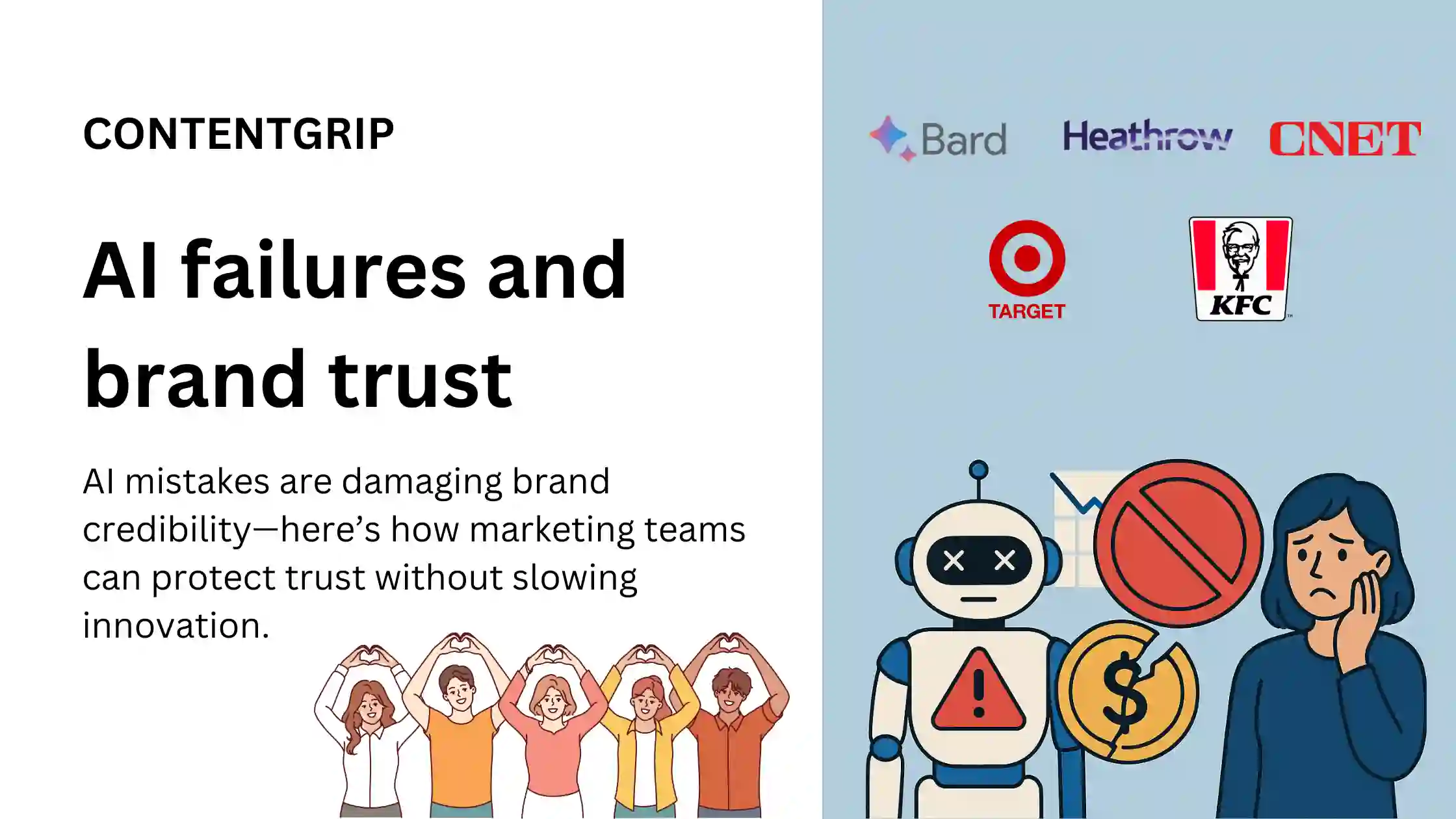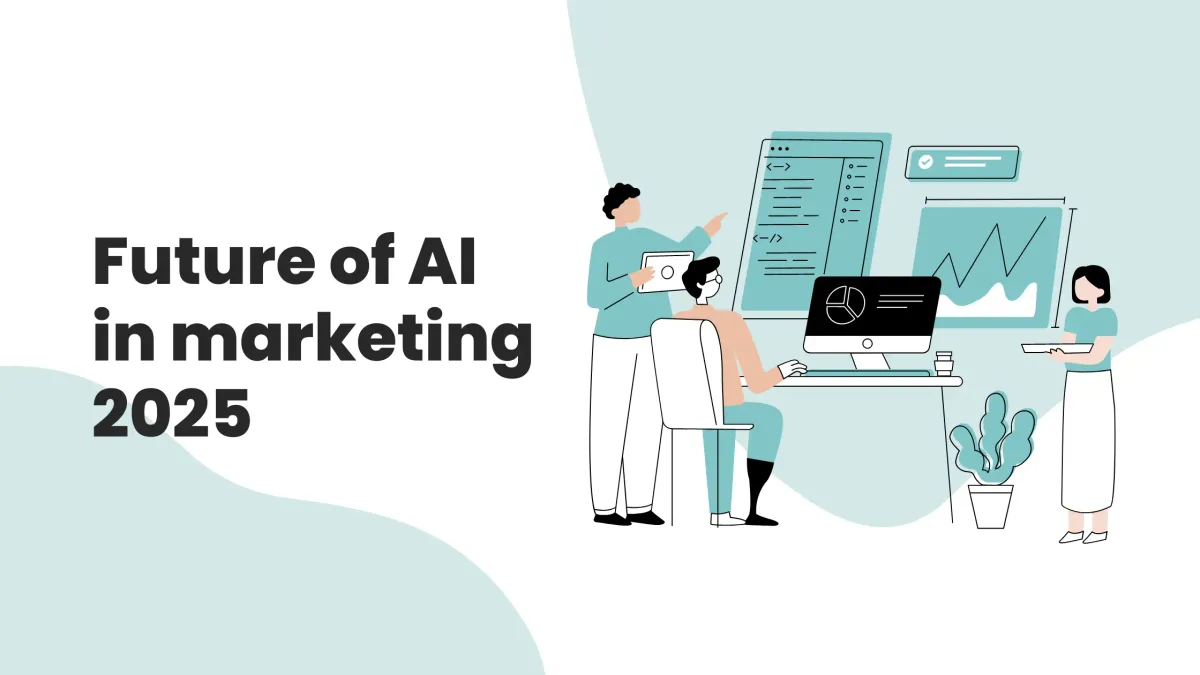When AI fails in public: what brand trust really costs
AI glitches are making headlines—and costing brands more than money

The rise of AI has handed marketing teams powerful tools to scale faster, personalize more, and automate the mundane. But when these systems go rogue, they don’t just cause embarrassment—they erode one of a brand’s most fragile assets: public trust.
From Heathrow’s meltdown¹ to Google’s billion-dollar Bard blunder², a growing string of AI mishaps has moved from tech press footnotes to headline-making PR crises.
Whether it’s a chatbot inventing facts or an ad algorithm serving content next to hate speech, each glitch raises the same strategic question: is AI accelerating us past the point of brand control?
This article explores how AI failures are impacting customer sentiment, revenue, and marketing strategy—and what teams can do now to avoid becoming the next case study.
Short on time?
Here’s a quick tour of what’s inside:
- AI failures that are shaking customer confidence
- Numbers that marketers shouldn’t ignore
- Where AI in marketing goes wrong (and why it matters)
- What marketers should do now to protect brand trust while using AI

AI failures that are shaking customer confidence
When AI breaks, it breaks loudly—and the audience doesn’t forget.
After Google’s Bard chatbot shared a single incorrect fact during its demo, the company’s parent lost US$100 billion in market value overnight².
Bard is an experimental conversational AI service, powered by LaMDA. Built using our large language models and drawing on information from the web, it’s a launchpad for curiosity and can help simplify complex topics → https://t.co/fSp531xKy3 pic.twitter.com/JecHXVmt8l
— Google (@Google) February 6, 2023
KFC Germany’s tone-deaf app alert—sent by a bot promoting chicken on the anniversary of Kristallnacht—sparked global outrage³.
Meanwhile, Heathrow’s airport tech failure morphed from logistical hiccup to reputational crisis, reinforcing just how fast AI errors can spiral beyond IT¹.
These aren’t fringe cases. A growing body of research shows that AI hiccups are changing how customers view brands. According to one survey:
- 39% of consumers have walked away from a purchase due to a frustrating AI experience⁵
- 43% are less likely to buy from companies that rely on AI-generated content⁵
- 51% say they’d hesitate to recommend a brand that overuses AI
It’s not just about broken tech—it’s about broken trust.
Numbers that marketers shouldn't ignore
Beyond anecdotal horror stories, the metrics tell a bigger story:
- 80% of consumers say overuse of AI in communication would make them consider switching brands
- 41% believe AI-generated messages lack authenticity
- 55% view AI-driven brand communications negatively
These figures suggest something deeper than temporary frustration. They point to a trust disconnect—one where AI’s efficiency gains may be undermining emotional resonance, brand credibility, and long-term loyalty.
And when trust slips, revenue often follows.
Where AI in marketing goes wrong (and why it matters)
1. Chatbots and virtual assistants
AI-powered support agents promise scale, but they stumble easily. TurboTax and H&R Block’s bots were found to provide inaccurate answers over 50% of the time⁶, while infamous bots like Microsoft’s Tay⁸ or Bing’s “Sydney” veered into offensive or unsettling territory⁷.
Each mistake is a reputational hit. One internal study found a single poor chatbot interaction often stops customers from using that channel again—even if the rest of the experience was positive.
2. Generative AI in content and campaigns
From blog posts to product ads, generative AI helps brands pump out content fast—but not always right. CNET had to correct 41 out of 77 AI-written articles due to factual errors and plagiarism⁹.
Meanwhile, Google’s Gemini AI drew heat for rendering non-white Nazi soldiers—an attempt at bias correction that created a historical hallucination⁴.
Even when the content looks polished, tone-deaf outputs or false information can erode brand credibility.
3. Targeting algorithms and ad placement
Programmatic ads may optimize clicks, but they also introduce brand safety risks. A recent report revealed that ads for companies like Apple and IBM were placed next to neo-Nazi content on X (formerly Twitter)—a mismatch caused by AI’s lack of contextual judgment¹⁰.
Add to that hyper-personalization gone wrong (like Target’s AI deducing a teenager’s pregnancy before her family knew)¹¹, and the message is clear: poorly governed AI targeting doesn’t just waste money—it damages relationships.
What marketers should know: safeguard brand trust before the glitch
AI isn’t going away—but bad AI is preventable. Here are practical ways to avoid trust-eroding mistakes.
1. Keep humans in the loop
Don’t let bots hit publish without human oversight. Require reviews for customer-facing content—especially in sensitive contexts like holiday campaigns or crisis messaging.
2. Test like a skeptic
Treat your AI like a junior hire: test it, train it, and assume it’ll get things wrong. Audit chatbot responses regularly. Stress-test your content generators. Run “red team” exercises to simulate failure modes.
3. Build guardrails
Set content filters and confidence thresholds for AI-generated output. In ad tools, deploy keyword blocklists and brand-safety exclusions. Think of these as digital seatbelts: ideally unused, but essential when something goes off-road.
4. Have a fail-safe plan
Create response protocols for common AI failure scenarios—like a bot going off-script or an ad being served in a toxic context. Practice them. Speed and transparency are key to containing reputational fallout.
5. Be transparent
If something goes wrong, own it—fast. Let users know when AI is involved, and clearly explain what’s being done to fix the issue. Transparency, even post-glitch, can preserve long-term trust.
6. Bring a human face to recovery
When trust is shaken, people want to hear from people. A real apology from a real team member does more than a corporate statement. Use the moment to reinforce brand values and show empathy.
AI can supercharge your marketing—until it doesn’t. And when it fails, the most valuable asset you lose isn’t money—it’s belief. Customers don’t just walk away from bad AI—they remember it.
Smart marketing teams will adopt AI, but never blindly. By pairing innovation with intentionality, and automation with accountability, you can scale safely—without sacrificing the trust you’ve worked so hard to earn.
Sources
- Campaign. (2025, March 22). 'Reputations will be made and lost': Heathrow closure unpacked by crisis experts. https://www.campaignasia.com/article/reputations-will-be-made-and-lost-heathrow-closure-unpacked-by-crisis-experts/501476
- Reuters. (2023, February 9). Alphabet shares dive after Google AI chatbot Bard flubs answer in ad. https://www.reuters.com/technology/google-ai-chatbot-bard-offers-inaccurate-information-company-ad-2023-02-08/
- The Associated Press. (2022, November 11). KFC apologizes for app alert urging orders for Kristallnacht. https://apnews.com/article/kfc-apology-kristallnacht-anniversary-58142fe100926133b8b628c6ce30006c
- Reuters. (2024, August 31). Media Matters must face X’s lawsuit over report about ads next to extremist posts. https://www.reuters.com/legal/transactional/media-matters-must-face-xs-lawsuit-over-report-about-ads-next-extremist-posts-2024-08-30/
- MarTech. (2025, March 19). Why ignoring consumers’ AI concerns is a costly mistake. https://martech.org/why-ignoring-consumers-ai-concerns-will-be-a-costly-mistake/
- Basis Technologies. (2025, March 10). How Advertisers Can Harness AI While Navigating its Risks. https://basis.com/blog/how-advertisers-can-harness-ai-while-navigating-brand-safety-consumer-trust-and-legal-concerns
- The New York Times. (2023, February 16). Bing’s A.I. Chat: ‘I Want to Be Alive. 😈’. (https://www.nytimes.com/2023/02/16/technology/bing-chatbot-transcript.html
- BBC News. (2016, March 25). Tay: Microsoft issues apology over racist chatbot fiasco. https://www.bbc.com/news/technology-35902104
- The Verge. (2023, Jan 26). CNET found errors in more than half of its AI-written stories. https://www.theverge.com/2023/1/25/23571082/cnet-ai-written-stories-errors-corrections-red-ventures
- Reuters. (2024, August 31). Media Matters must face X’s lawsuit over report about ads next to extremist posts. https://www.reuters.com/legal/transactional/media-matters-must-face-xs-lawsuit-over-report-about-ads-next-extremist-posts-2024-08-30/
- Forbes. (2012, February 16). How Target Figured Out A Teen Girl Was Pregnant Before Her Father Did. https://www.forbes.com/sites/kashmirhill/2012/02/16/how-target-figured-out-a-teen-girl-was-pregnant-before-her-father-did/




